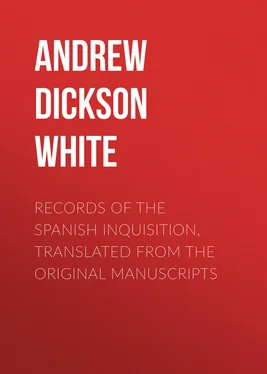Andrew Dickson White - Records of the Spanish Inquisition, Translated from the Original Manuscripts
Здесь есть возможность читать онлайн «Andrew Dickson White - Records of the Spanish Inquisition, Translated from the Original Manuscripts» — ознакомительный отрывок электронной книги совершенно бесплатно, а после прочтения отрывка купить полную версию. В некоторых случаях можно слушать аудио, скачать через торрент в формате fb2 и присутствует краткое содержание. Жанр: foreign_prose, foreign_religion, Философия, foreign_psychology, foreign_antique, на английском языке. Описание произведения, (предисловие) а так же отзывы посетителей доступны на портале библиотеки ЛибКат.
- Название:Records of the Spanish Inquisition, Translated from the Original Manuscripts
- Автор:
- Жанр:
- Год:неизвестен
- ISBN:нет данных
- Рейтинг книги:3 / 5. Голосов: 1
-
Избранное:Добавить в избранное
- Отзывы:
-
Ваша оценка:
- 60
- 1
- 2
- 3
- 4
- 5
Records of the Spanish Inquisition, Translated from the Original Manuscripts: краткое содержание, описание и аннотация
Предлагаем к чтению аннотацию, описание, краткое содержание или предисловие (зависит от того, что написал сам автор книги «Records of the Spanish Inquisition, Translated from the Original Manuscripts»). Если вы не нашли необходимую информацию о книге — напишите в комментариях, мы постараемся отыскать её.
Records of the Spanish Inquisition, Translated from the Original Manuscripts — читать онлайн ознакомительный отрывок
Ниже представлен текст книги, разбитый по страницам. Система сохранения места последней прочитанной страницы, позволяет с удобством читать онлайн бесплатно книгу «Records of the Spanish Inquisition, Translated from the Original Manuscripts», без необходимости каждый раз заново искать на чём Вы остановились. Поставьте закладку, и сможете в любой момент перейти на страницу, на которой закончили чтение.
Интервал:
Закладка:
On the seventeenth day of September, one thousand six hundred and thirtyfive, at three o’clock in the afternoon, Pedro Ginesta, of Auvergne, bishopric of St Flor, was by order of the Inquisitors put in the secret prison of the Inquisition and intrusted to the care of P. Fontanella, Alcayde of the said prison, who examined the prisoner and allowed him nothing prohibited by his instructions. The articles found upon him, were, two shirts, a pair of breeches, a purse, one dinero and three sueldos , which have been given in charge to the Camara de Pablo.
Pedro Fontanella.In the Royal Palace of the Inquisition of Barcelona, on the eighteenth day of September, one thousand six hundred and thirtyfive, the Inquisitor, Doctor Domingo Abbad y Huerta being at his morning audience, ordered the prisoner to be brought from his cell; who, being produced, was sworn to declare the truth on the present as well as on all other occasions till the decision of his trial. He was also sworn to observe secrecy with respect to everything which he might see, hear, or learn, and everything which should befall him.
Questioned, what was his name, age, occupation, birthplace, residence, and the period of his arrestation by this Holy Office.
Answered, that his name was Pedro Ginesta, by occupation a brazier, native of the village of Orliach, bishopric of St Flor, in the kingdom of France, residing at Orcan, in Catalonia, having exercised the trade of a brazier in that country more than fourteen years, of age eighty years or thereabout, and that he was arrested by a Commissary of the Holy Office, yesterday, in the town of Salas.
Questioned, who was his father, grandfather, paternal and maternal, and wife; who were his uncles, brothers, and children; what were their occupations, birthplaces, and residences. [ Here follows a long account of the prisoner’s relatives, in answer to the particulars specified. ]
Questioned, what was the origin and descent of his ancestors and collateral relatives, and whether any one of them had been punished or put under penance by the Holy Office of the Inquisition.
Answered, that all his relatives were old Roman Catholic Christians, 13 13 ‘The least mixture of African, Indian, Moorish, or Jewish blood taints a whole generation. Nor does the knowledge of such a fact die away in the course of years, or become unnoticed from the obscurity and humbleness of the parties. Not a child in this populous city (Seville) is ignorant that a family, who, beyond the memory of man, have kept a confectioner’s shop in a central part of the town, had one of their ancestors punished by the Inquisition for a relapse into Judaism. I well recollect how, when a boy, I often passed that way, scarcely venturing to cast a side glance on a pretty young woman, who constantly attended the shop, for fear, as I said to myself, of shaming her. A person free from tainted blood is defined by law, ‘Christiano viejo, limpio de toda mala raza.’ An old Christian, free from all bad race and stain. The severity of this law, or rather of the public opinion enforcing it, shuts out its victims from every employment in church or state, and excludes them even from fraternities , or religious associations, which are otherwise open to persons of the lowest ranks. I verily believe that were St Peter a Spaniard, he would either deny admittance into heaven to a people of tainted blood, or send them to a retired corner, where they might not offend the eyes of the old Christians .’ Doblado’s Letters from Spain.
and that no one of them had ever been punished or sentenced by the Holy Office up to the present day.
Questioned, if he was a baptized and confirmed Catholic, and made it a practice to attend mass, go to confession, and receive the sacrament at such times as are prescribed by the Holy Catholic Mother Church; at what time he last attended mass, and from whom he received the holy sacrament.
Answered, that he was a baptized and confirmed Christian, having by the grace of God been baptized in the church of Santanti, metropolitan of the suffragans of Caberna and other places, and that he knew himself to have been confirmed by a bishop named Panlaza in the city of Huerca in Arragon, or Poroteo, bishop of that kingdom, more than forty years since, in the cathedral; that he remembered the fact of the confirmation very well, being then of full age; that he hears mass every Sunday and holiday, except when he is travelling; that he confesses and communicates at every time fixed by the Holy Mother Church; that he has certificates to this effect; that he believes the last time he confessed was on Passion Week last, in the town of La Puente de Montania, to a priest of that church; that he does not remember the name of the person from whose hands he received the sacrament. The prisoner then made the sign of the cross, invoking the Father, Son, and Holy Ghost, and repeated the four prayers and general confession correctly in Latin, and stated that he knew nothing more of the christian doctrine.
Questioned, if he could write, or read, or had studied any science or faculty.
Answered, that he could neither write, nor read, nor had he studied any science or art.
Questioned, if he had ever left the kingdoms of Spain since his first arrival, or had any dealings with people of equivocal faith.
Answered, that he had exercised his trade of a brazier for more than sixty years, in the kingdoms of Catalonia and Arragon, visiting at times his home in France, where there are no Lutherans, nor any persons of equivocal faith.
Questioned, what were the events of his life.
Answered, that he was born, as above stated, in the village of Orliach, and remained with his father till twenty years of age assisting him in his profession of a brazier; that he had passed his life in France, Arragon, and Catalonia, his father having brought him while a boy into this country, where he died, and left him, sixty years since, in the town of Erla, near Gea, in Arragon, working all this time in various places, where he became well known; that his wife had never been in Spain at any time.
Questioned, if he knew or conjectured the cause of his imprisonment.
Answered, falling on his knees, weeping, and beating his breast, that he had committed an offence against our Lord by eating bacon on the eve of St Bartholomew in the village of Semiana, and that it was true he had been told on the day previous, by the hostess of the house where it was done, that the next day was a fast, but not remembering this intimation, he had, while the hostess was gone out of the house to her oven, eaten of the same in company with a certain youth of fourteen or fifteen years of age, a native of the bishopric of Clermont in France, who had come to work with him two days before; and that while they were eating, the hostess returned and again reminded him that it was the fast of St Bartholomew, and they ought not to eat it, upon which they immediately abstained from eating; that they were both arrested and brought on the road to Barcelona under guard of one man, the youth with his hands tied; that on arriving near a wood he escaped notwithstanding the exertions made by the guard, who raised the neighbourhood to search for him; and if in this he had offended our Lord, he begged for pardon and mercy.
The prisoner was then informed, that, in this Holy Office, it was not customary to apprehend any person without sufficient information that he had said, done, or witnessed the commission of something really or apparently offensive against God our Lord, or against his Holy Catholic faith and evangelical law, taught and preached by the Holy Mother Roman Church, or against the just and free exercise of the Holy Office; consequently he was to understand that he was imprisoned on account of some such information, and he was admonished on the part of God our Lord, and the glorious and blessed Virgin Mary, to recollect himself and confess his offences without concealing anything relating either to himself or any other person, and without uttering false testimony against any one; by doing all which, his trial should be dispatched with all brevity, and decided with that mercy which is shown by the Holy Office to all those who confess freely; otherwise, justice should be executed.
Читать дальшеИнтервал:
Закладка:
Похожие книги на «Records of the Spanish Inquisition, Translated from the Original Manuscripts»
Представляем Вашему вниманию похожие книги на «Records of the Spanish Inquisition, Translated from the Original Manuscripts» списком для выбора. Мы отобрали схожую по названию и смыслу литературу в надежде предоставить читателям больше вариантов отыскать новые, интересные, ещё непрочитанные произведения.
Обсуждение, отзывы о книге «Records of the Spanish Inquisition, Translated from the Original Manuscripts» и просто собственные мнения читателей. Оставьте ваши комментарии, напишите, что Вы думаете о произведении, его смысле или главных героях. Укажите что конкретно понравилось, а что нет, и почему Вы так считаете.












